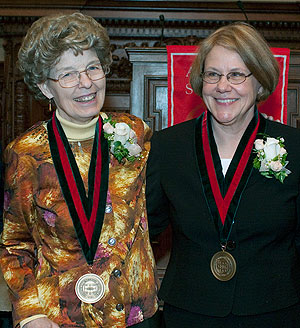In naming biologist Barbara Schaal, Ph.D., the Mary-Dell Chilton Distinguished Professor in Arts & Sciences, Washington University honors two of its pioneering women biologists, said Chancellor Mark S. Wrighton at Schaal’s installation in Holmes Lounge March 9.

“This is a proud moment in Washington University’s history,” Wrighton said. “While conducting research in the biology department in the late 1970s, Mary-Dell Chilton, Ph.D., made an astonishing discovery that led to the emergence of the new scientific field of plant genetic engineering. This discovery revolutionized plant science and gave plant geneticists who followed, such as Barbara Schaal, the ability to translate that knowledge into improving the world’s food crops.”
Schaal, previously the Spencer T. Olin Professor in Arts & Sciences, also holds a joint position as professor of genetics in the School of Medicine. In addition, she is serving as the first female elected vice president of the National Academy of Sciences.
“Through her outstanding work, Barbara brings a high level of distinction to the biology department, to Arts & Sciences and to Washington University,” said Edward S. Macias, Ph.D., provost, executive vice chancellor for academic affairs and the Barbara and David Thomas Distinguished Professor in Arts & Sciences.
“In addition to being a preeminent scientist, she has been a leader in a host of professional organizations,” Macias said. “Scientists from around the world are familiar with her achievements. In so many ways, her work has global impact.”
Schaal’s research, which has been published in more than 150 scholarly journals, involves studying the evolutionary genetics of plants, with the goal of applying that research to enrich plants such as the cassava, which serves as a major food source for sub-Saharan African populations. Her team studies the use of DNA sequences to understand evolutionary processes such as gene flow, geographical differentiation and the domestication of crop species.
Ralph Quatrano, Ph.D., interim dean of the faculty of Arts & Sciences and the Spencer T. Olin Professor, said of her dedication to students: “Barbara understands the centrality of the teaching mission here, the importance of collaborating and mentoring students.”
Quatrano said Schaal also is an outstanding citizen of the University, having served on a number of committees, and, from 1993-97, chaired the department.
One way to gauge the importance of Schaal’s research is that it is primarily supported through highly competitive funding from the National Science Foundation. Another measure involves her advisory role for scientific issues for the U.S. government as chair of the Division of Earth and Life Studies of the National Research Council.
Throughout her career, Schaal has been honored with prestigious awards, including a Guggenheim Fellowship, the Key Award from the American Genetics Association and the Distinguished Alumni Award from the University of Illinois.
At WUSTL, she has received the Founders Day Distinguished Faculty Award and the Arthur Holly Compton Faculty Achievement Award.
Born in Berlin, Germany, Schaal grew up in Chicago and became a U.S. citizen in 1956. She earned an undergraduate degree in biology from the University of Illinois at Chicago and a doctorate from Yale University. Before joining WUSTL in 1980, she taught at the University of Houston and Ohio State University.
Kathryn Miller, Ph.D., chair of the biology department and professor, viewed Schaal’s appointment as an appropriate link. “It is very fitting that this distinguished professorship honoring Mary-Dell Chilton be conferred on Barbara Schaal,” Miller said. “They are both remarkable and accomplished women who have had major impact worldwide through the research they performed at Washington University.”
Currently, Chilton is distinguished science fellow and principal scientist II at Syngenta Biotechnology Inc., located in Research Triangle Park, N.C. Syngenta supplies crop protection and seed products and develops all of its genetically modified crop seeds.
Chilton’s contributions to the biotech company are such that her portrait hangs prominently within the administrative and conference center, which is named after her.
She has served in a number of key roles at Syngenta since leaving WUSTL in 1983 as associate professor in biology.
Prior to this, Chilton worked as a postdoctoral researcher and research faculty member at the University of Washington. She earned undergraduate (with highest distinction) and graduate degrees in chemistry from the University of Illinois at Urbana-Champaign.
While at the University of Washington, Chilton led a team from three departments in a study of how a bacterium can cause tumors (gall) to grow on plants. They found that the bacterium carried tumor-inducing genes that it specifically transferred into the plant cell, making them grow rapidly. Chilton recalls the irony of giving cancer to tobacco plants, which were the white rats of the plant kingdom.
At WUSTL, her group studied how this worked and found a way to “disarm” the tumor-inducing genes and get the bacteria to insert genes for crop improvement. In a collaboration with Andrew Binns, Ph.D., of the University of Pennsylvania, Chilton’s team produced the first transgenic plant and showed that it passed the new trait to its progeny.
In 2002, Chilton joined the list of such scientific luminaries as Thomas Edison and Marie Curie as the recipient of The Franklin Institute’s Benjamin Franklin Medal in Life Sciences. Other major honors include being inducted into the National Academy of Sciences in 1985 and the American Academy of Arts and Sciences in 1993.